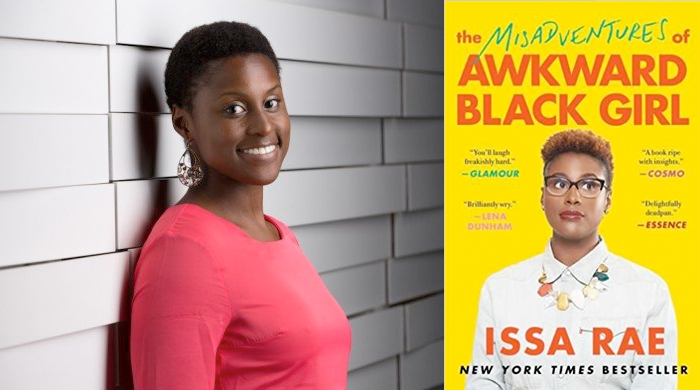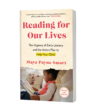The Misadventures of Awkward Black Girl is a romp of self-deprecating wit relating the anxiety-ridden life experiences of a trilingual, fashion-deficient, Stanford-educated, Halfrican millennial. The mix is fresh, funny and necessary.
In her debut essay collection, Rae mines her life’s most embarrassing episodes for our amusement—and entertain they do. Her inventory of humiliations spans the merely amusing—piano fails and dancing disability—to the downright dangerous—wearing head-to-toe red in a Crip neighborhood and harboring a cockroach in her jumpsuit on an international flight. She seems to alternately invite the reader to laugh with her or at her. We oblige, because we don’t have the moxie to give our own foibles a book’s worth of scrutiny.
We need authentic representations of black women, and there is something both satisfying and subversive about Rae’s book. She gives us a portrait of a well-educated, creative, entrepreneurial woman. Yet she sidesteps the damaging pitfall of presenting a flawless front to bolster respectability and approval. Instead, she jokes about experiences most would edit out of their public profiles, such as catfishing (AKA lying online) at eleven and getting blocked on Twitter by a disabled stripper years later. She’s giving us her humanity, warts and all.
Anecdotes like these are more than entertaining. They are unexpected and lovable–and give old folk a glimpse into the mix of technology, media and public exposure shaping the YouTube generation. “At the time I came up with the concept for ABG I was just a clumsy, frustrated, socially inept, recently graduated adult, looking for confirmation that I wasn’t alone…” she writes. “But at some level, as each new model for social media strives to connect us in new, paradoxically estranged ways, there exists a consistent core, the human desire to feel included.”
At its heart, this book is a chronicle of how little Jo-Issa Rae Diop (rhymes with hope) grew into her alter ego Issa Rae. It’s a book about the fits and starts of forging an identity that’s both truthful and expansive enough to propel one’s dreams into reality. (It joins Gail Simmon’s underrated “Talking with my Mouth Full” on my list of graduation gifts for girls, because it exemplifies the wisdom of allowing ourselves to love what we love, instead of blindly following traditional career paths.)
Part of her coming-of-age story deals with learning to navigate inter- and intraracial relationships. In one of my favorite chapters, she offers a guide for awkward blacks to connect with other blacks. By outlining 14 distinct types of black people and acknowledging hybrids among them, she strikes another blow against monolithic representations. Refreshingly, the categories aren’t defined by the extent to which individuals dial “blackness” up or down in response to the whims and prejudices of white people. (Think: Justin Simien’s One Hun-ned, Nose Job and OOFTA categories in “Dear White People.”) She gives us The 10% Black, The Basic Black, The Know-It-All About Blacks Black, The LGBT Black and many more, and they all ring true.
At the same time, she reveals her personal ambivalence about and fatigue with talking (and writing) about race, particularly with blacker-than-thou people–white and black–who embrace narrow pop culture stereotypes as the epitome of blackness. It’s much more fun–and funny–to explore people’s individual eccentricities. Take schoolmate Remington, the “8th-grade-looking 6th-grader” who “frequently expressed his sexual desires in a way that hinted at experience.” And Grandpa, who counters kids’ fast-food requests with “we gon’ make our own MackDonald’s.” (Think: Nasty homemade patty accented with green pepper and onion.) Rae excels at quippy characterization of the supporting actors in her embarrassments.
On the book’s cover, Rae strikes a Wonder Woman pose under an awkward girl banner, looking anything but. In truth, she’s becoming less and less awkward all the time. By some magic, she’s transformed social ineptitude into a web series, a book, a livelihood. Awkward and all, she’s a new-look leading lady.
Quibbles: The stories are well-chosen and Rae’s humor is refreshing, but the writing itself does get awkward in unwelcome ways. She’s “hot with regret” when an attempt to nickname herself Sloppy Jo flops. Later she’s “hot with embarrassment and shame” when her grandfather calls her fat. Labeling emotions instead of trusting us to feel them is a rookie move. No need to name what the scene evokes and the reader intuits. As Roy Peter Clark puts it, “subtlety is a writer’s virtue.” Still, her foibles are forgivable, easily remedied and take nothing away from my eagerness to see what (mis)adventures she chronicles next. Issa Rae’s The Misadventures of Awkward Black Girl is the first selection of the Inkwell Book Club, an online national book club designed to promote good books, wield marketplace influence, and help black writers earn a living wage. Amen.


